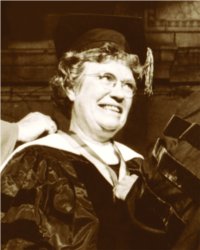Elizabeth Blackwell Award
Margaret Mead

Margaret Mead began her long career in anthropology as an undergraduate at Barnard College under the tutelage of Franz Boas, recognized as the father of American anthropology.
At the age of 25, she spent a year as a National Research Council fellow in Pago Pago where she studied cultural concepts of adolescence. In doing do, Mead was the first anthropologist to look at human development in a cross- cultural perspective. The result was her widely acclaimed first book, “Coming of Age in Samoa.”
She earned her Ph.D. from Columbia University and joined the American Museum of Natural History as an assistant curator of ethnology in 1926. She rose through the ranks at the museum and was appointed curator emerita in 1969.
In addition to her duties at the museum, Mead served at the National Research Council and as a professor at several universities, including Columbia, New York University and Yale. In 1965, she founded the Urban Anthropology Department at NYU, and in 1968, she founded an anthropology department at Fordham University. She was named “Mother of the World” by Time magazine in 1969.
Mead spent many years living with various South Seas peoples, during which time she learned seven indigenous languages. When not abroad, she wrote numerous monographs, narrated several films, and wrote a myriad of books. She was well- known for her clear writing style, allowing laypeople to both comprehend and enjoy the information she learned from her research. She authored more than 20 books including “Growing Up in New Guinea,” “Soviet Attitudes Toward Authority,” “An Anthropologist at Work” and “Peoples and Places.”
She died in 1978 and was awarded the Presidential Medal of Freedom posthumously.
